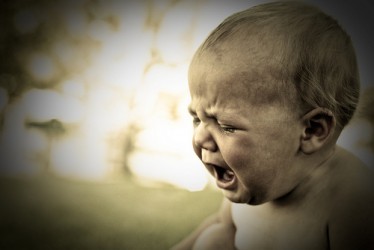Dear Rabbi Zalman,
I seem to remember from Jewish summer camp that Tisha B’av is a sad holiday, and sort of a big deal, but I can’t for the life of me remember why. Can you fill me in? And how am I supposed to commemorate it?
– Jewish Camp Alum
Your memory serves you correctly. Tisha B’Av (the 9th day in the Jewish month of Av, and, this year, sunset July 28 – nightfall July 29) is indeed a sad holiday; in fact it has been called the “saddest day in Jewish history.”
On this day, the Babylonians destroyed the Temple of Solomon in 586 B.C.E. Six hundred and fifty-five years later, on the same date, the Romans burned down the Second Temple. This fatal coincidence linking the nation’s two greatest disasters has left an ineradicable scar on the memory of the Jews.
Although primarily meant to commemorate the destruction of the Temples, it is also considered appropriate to commemorate other Jewish tragedies that occurred on this day. Most notably, this date marks the expulsion of the Jews of England in 1290, as well as the greatest catastrophe in medieval Jewish history, the expulsion of the Jews from Spain on the ninth of Av 1492 (it is possible that King Ferdinand and Queen Isabella sadistically chose these dates to intensify the Jews’ misery and horror). During the Holocaust, the Nazis took pleasure in organizing murderous actions against Jewish communities on the ninth of Av.
To put all this in context: imagine the outbreak of the Civil War, the Pearl Harbor attack, the Stock Market Crash, the Bay of Pigs Invasion, the assassination of Presidents Lincoln and JFK and 9/11 all happened on the same day. That day would undoubtedly be the saddest, darkest day for the American nation.
That’s sort of what Tisha B’Av is for the Jewish people.
There is a statement in the Talmud (Ta’anit 29b): Good things are brought to pass on an auspicious day and bad things on an ominous day. Jewish tradition apparently takes this very seriously. Case in point: Tisha B’Av.
This day is our national day of mourning, and it, more than any other day, expresses our deep feeling of sorrow at the destruction of the Temple. Our exile and all the suffering we have suffered throughout the past 2000 years stemmed from that one event.
It is perhaps for this reason that, when Menachem Begin became Prime Minister, he wanted to unite all the memorial days and days of mourning on Tisha B’Av, so that Holocaust Remembrance Day and Memorial Day would also fall on this day.
In addition to being a full fast day, beginning from the evening of the 8th of Av, some other laws and customs of the day include reading the Book of Lamentations, followed by the kinnot, a series of liturgical lamentations. Observant Jews also refrain from bathing, wearing make-up or leather shoes (both symbols of luxury) and marital relations. Work is permitted on Tisha B’Av. In Israel, restaurants and places of entertainment are closed on the eve of Tisha B’Av and the following day by law.
Some have argued that, with the birth of modern Israel, mourning for the fall of Zion has become an anachronism. But the Jewish national memory is long. It is not likely that the grim date of the capture of Jerusalem and the ruin of the two Temples will be forgotten.
The Talmud (Yoma, 9) informs us that the Temple was destroyed because of Sinat Chinam (unwarranted hatred) — to this day the Third Temple has not risen — apparently this sin is still haunting us to this day…
There is only one happy association with the holiday of Tisha B’Av. From the ashes of the destroyed Temple will rise an incomparably magnificent edifice. Exile will give birth to redemption. It is a tradition that our redeemer will be born on Tisha B’Av (Although some explain this idea metaphorically, as the hope for the Jewish Messiah was born on Tisha B’Av with the destruction of the Temple). It is a day of anticipation and hope, for “One who mourns Jerusalem will merit seeing her happiness.” (Talmud, Ta’anit 30b.) As the verse (Isaiah 66:10) promises: ‘Rejoice with her greatly, all who mourn for her.‘
(Photo: MemeKode)



1 comment